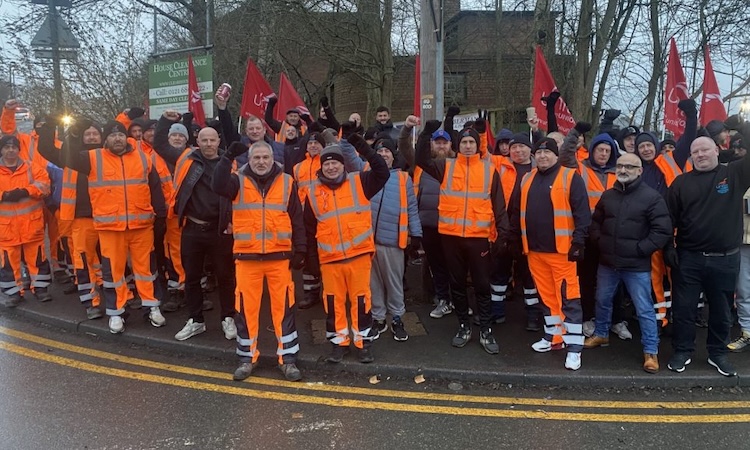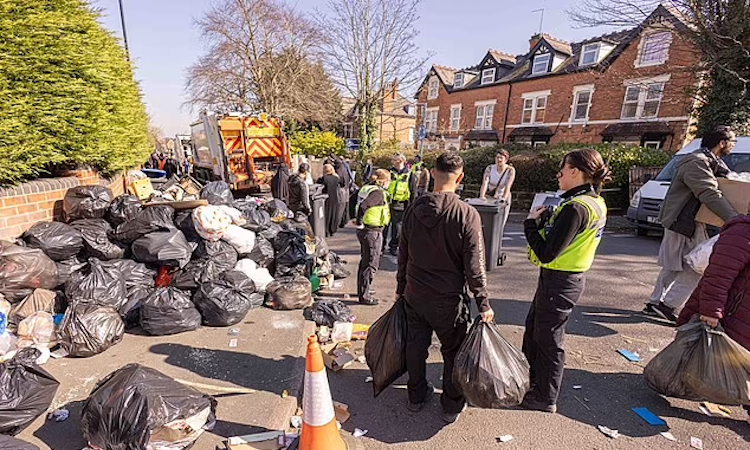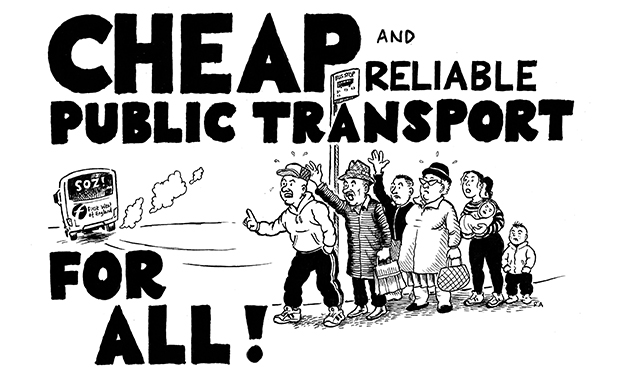Six months on from the start of the Birmingham binmen’s strike over the imposition on many of them of a massive pay cut, nothing seems to be happening.
The local council, under the control of commissioners appointed to manage the council’s financial affairs because of its insolvency, has announced that it is too broke to be able to offer anything more than has already been offered and rejected. And the workers, whose average pay is only slightly above the minimum wage, are adamant that they can’t afford to accept a pay cut, be it immediate or slightly delayed.
One worker who stands to lose some £8,000 a year, pointed out that the council is putting up its rents while expecting workers to manage on lower pay. There has been criticism of both the council and of Unite the Union for the absence of negotiation since April, when the council’s final offer was turned down by a ballot of members. But the fact is that negotiations have reached an impasse, with neither side prepared to concede anything further.
The council and the government-appointed commissioners, who take their instructions from the government, are clearly hoping that the strikers will gradually give up, accept offers individually, take other jobs or die off.
Who should pay the cost of the capitalist crisis?
An important issue is at stake, however, that goes beyond the interests of the workers who are actually striking. Is the working class willing to accept that it ought to accept pay cuts if its employers are losing money? And, in particular: is it willing to accept that those who work for the government or local government should accept pay cuts if the government and/or local government is underfunded for the services they are expected to carry out?
At a time when it is estimated that the combined wealth of some 55 British billionaires in 2024 increased by some £35m a day in 2024 (over half a million a day each), workers have every right to dig in their heels to demand a fairer distribution of national wealth. Why should the uber-rich be handed all this wealth to add to their already extremely comfortable existence, while workers’ living standards are constantly being eroded towards penury?
The government and local governments are underfunded precisely because the billionaires, both domestic and foreign, happily evade tax on an industrial scale and routinely threaten to move their operations abroad, making their workers all redundant, if governments do not accommodate their avarice. Meanwhile, when monopoly corporations and banks get into financial trouble, they are bailed out and their debts are nationalised, adding to the already heavy debt burden on the national treasury.
It does not matter what political party is in government – all of them, despite the best intentions of the occasional political leader, have to kowtow to the demands of finance capital – ie, the billionaire ruling class – or else face dire economic consequences.
That is the capitalist system under which we live. The rich get richer and the poor getter poorer. Any concessions that are made to the working class arise only as a result of the latter’s class struggle, particularly where the ruling class senses that it may be in danger of being overthrown.
Hence the binmen’s resistance is essential in the struggle to prevent the avaricious from attacking the living conditions of the working class at an even faster pace than they are already doing.
Government and council forking out millions to defeat the strike
Unsurprisingly, to defeat working-class struggles, no expense is spared. Birmingham council has at great expense (despite its bankruptcy) mobilised sufficient scab labour to remove the worst of the rubbish – especially in the more prosperous areas of the city.
According to Unite, the council prepared well in advance for the inevitable strikes that would occur as it implemented its policy of fire-and-rehire in order to reduce its wages bill.
“A freedom of information (FOI) request by Unite shows that Birmingham council had 493 temporary workers on its books as of 31 December 2024 paying an average of £18.44 an hour per worker to the Job&Talent employment agency. This equates to £38,400 a year on a standard work schedule of 40 hours per week for 52 weeks …
“Employing 493 temporary agencies workers full-time would cost the council approximately £18.9m. The same number of directly employed workers with salaries of £25,000 a year equates to £12.3m.
“The disarray within Birmingham council’s refuse service is further exposed as the combined number of permanent and agency staff was revealed to be 1,229. This is 237 workers over the 992 posts in the council’s refuse service …
“Unite general secretary Sharon Graham said: ‘… the council has decided to waste even more money by using Job&Talent to provide unlawful labour to undermine the strikes’.”
The six commissioners who have been appointed by the government are each collecting at least £1,100 a day plus their hotel and travel expenses, all of which amounts to around £1.5m each year, and which has to be paid by the council – ie, by the city’s residents. These highly-paid commissioners have effectively vetoed any concession to the striking workers.
Anti-union laws act to stunt the effectiveness of strike action
Given that some 40 percent of the council’s binmen are agency workers, many of whom were employed by the council to act as scabs even before the strike began, the impact of the strike can be severely curtailed if these people continue working as normal, thereby helping the council to prolong its resistance and ignore the strikers’ demands.
Therefore strikers naturally resorted to action to prevent normal work. In particular, they made efforts to block the free movement of dustcarts by stepping in front of and/or leaning against the vehicles, and by blocking road junctions.
Inevitably, the judiciary was mobilised to prevent this rather effective form of picketing. Back in May, the court issued an injunction to restrict the actions of the pickets to just standing around. When these pickets ignored the injunction, the council went back to court to threaten their union with sequestration of its assets if the pickets continued their action.
Had it not submitted to the court’s demands and its assets had been seized, the union would not have been able to continue paying strike pay to the strikers, or salaries to its employees. So Unite’s bosses undertook to ensure that the injunction was obeyed.
The costs of pursuing these court actions will have been substantial, but the amount has not yet been ascertained or disclosed. Again, it will be council taxpayers who will bear the cost, except insofar as it has to be paid by the union.
There have been two so-called ‘mega-pickets’ held at times midweek which guarantee that no mass support can be organised. The authorities take not the slightest notice and once the pickets are over everyone quietly goes home.
The hamstrung union has taken some measures in support of the binmen, including suspending the union membership of council leader John Cotton, several Labour councillors, and Angela Rayner, who, as deputy leader of the Labour government, was responsible for the hostility of the government to the binmen’s interests.
The union has also shifted from giving donations to the Labour party to giving them to individual Labour MPs perceived as being ‘left-wing’ (a group that included Angela Rayner in the past!) Nevertheless, the union has totally failed to mobilise other workers to down tools in support of the strikers.
Sympathy strikes are illegal so Unite will not call them for fear of its funds being sequestered in the way those of the National Union of Mineworkers (NUM) were during the great miners’ strike of 1984-5.
Since those days, notwithstanding there having been a Labour administration in government from 1994 to 2010 and currently, the anti-trade-union laws, passed under Margaret Thatcher’s government, which outlawed sympathy strikes and are the basis of the sequestration of union assets, remain fully in force.
There is not a single major electoral party – Tory, Labour, Liberal, Green or Reform – capable of standing up to the might of the billionaire ruling class, its infinite wealth, its state machine. All of them prefer to scapegoat the weakest sections of the working class – immigrants, muslims, the poor and/or the elderly – in order to put workers at each other’s throats, rather than to denounce (let alone act in opposition to) their imperialist masters of finance capital.
What we in the working class need to remember is that the ruling class is tiny, while we are very, very many. When we in the working class determine to end this life-destroying capitalist system by overthrowing our ruling class and seizing control of all its assets in order to put them to use to provide for people’s needs, in the short term we will gain more concessions, and in the longer term we have a world to win.














